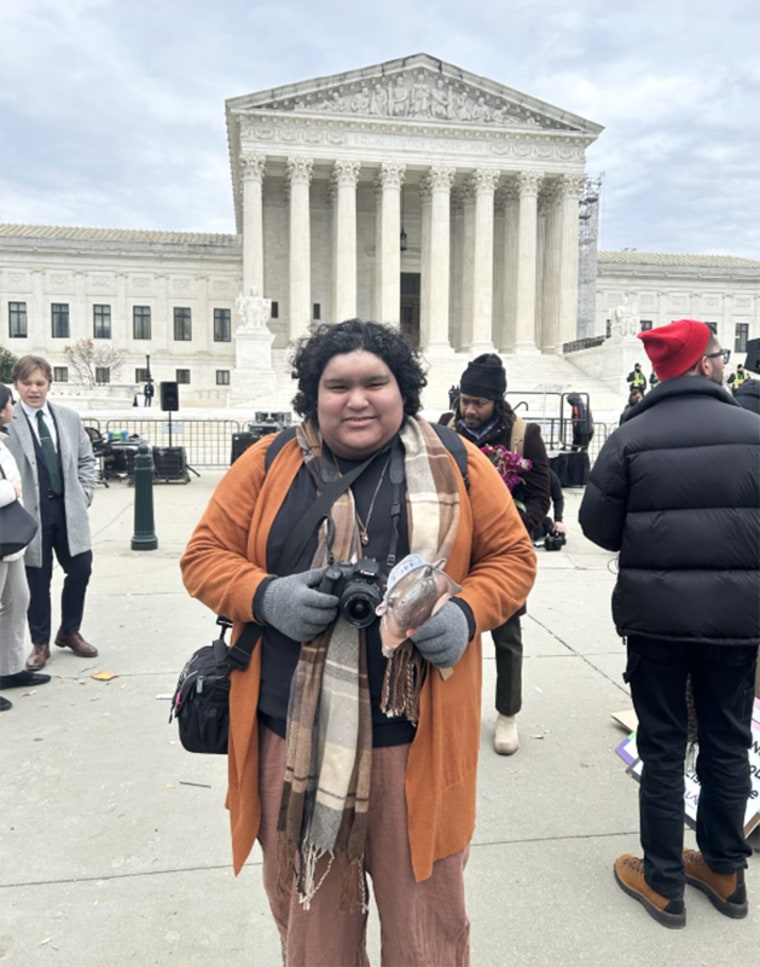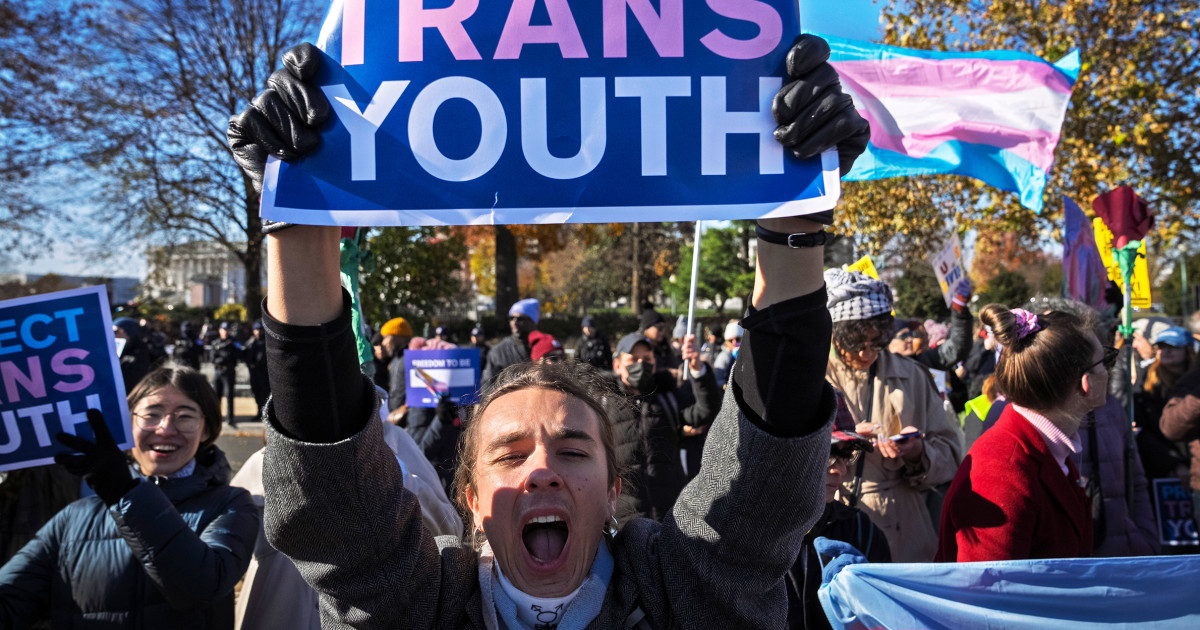WASHINGTON — Dozens of transgender people, along with their families and allies, gathered outside the Supreme Court on Wednesday as the justices considered a Tennessee law banning access to puberty blockers and hormone therapy for trans minors.
Some of them, like Lisa and Ryan Welch, traveled hundreds of miles to be in Washington. The Welches, who live in Indianapolis, have a 17-year-old trans son and are the plaintiffs in a suit against a similar law in Indiana.
“We absolutely know that this care saved our son’s life,” Lisa said through tears. “He didn’t think he had a future. He didn’t plan for anything, because he didn’t think he was going to be a boy, and he didn’t think he was going to be around.”

Ryan said that before their son received transition-related care, he struggled with suicidal ideation and anxiety. Now, after having gotten care, he’s preparing to go to art school.
Lisa said, “To see that light return to his eyes, I’m never going to stop fighting.”
Ryan said that with Indiana’s restriction in effect, they have to drive their son about three hours to Chicago every three to six months for appointments and over the border to another part of Illinois about once a month to pick up testosterone.
The stakes of the high court’s decision in United States v. Skrmetti are high for the Welch family and many others who were gathered both inside and outside the court Wednesday.
The central issue the justices are considering is whether Tennessee’s law discriminates on the basis of sex. If the court says it does, the law would be subject to a stricter level of constitutional review that would be difficult to meet. If the court rules it doesn’t, then Tennessee’s law and similar restrictions in 25 other states would most likely stand. A decision against the sex-discrimination claim would also undermine a key argument against a similar policy proposal from President-elect Donald Trump to restrict transition-related care for minors and adults at the federal level.
The questions the majority conservative court asked during oral arguments appeared to suggest that the justices didn’t quite buy that the law discriminates based on sex, with some of them appearing to favor the state’s argument that it restricts care based on its medical purpose.
Many of those who showed up outside the court Wednesday said they wanted to show their support for the trans teens and a doctor who sued Tennessee.
Kaleb Todd, 27, said that he has a personal connection to the decision both because he is a trans man and because he and his wife chose to move from Texas to Philadelphia in April because they want to start a family soon and they fear Texas’ policies regarding women, educators and trans people.
Todd, an engineer, said he also showed up outside the court in the chilly temperatures to send a message to the court itself.
“I think it’s important to remind people who get to make these decisions that we’re here and we’re beautiful and we know what’s best for ourselves,” Todd said.
Vienna Cavazos, who is 18 and uses they/them pronouns, traveled from Delaware because, they said, the “monumental case is extremely important, not only to me and my family,” but also in their work crafting pro-LGBTQ policy in Delaware.

Like Todd, Cavazos is from Texas. Their family moved in 2022 following an executive order from Texas Gov. Greg Abbott in February that called on citizens to report parents to the state’s Child Protective Services agency if they provided transition-related care to their minor children.
Cavazos said that they planned to begin receiving such care but that “it was either we wait until I turn 18 or leave Texas. We were fortunate enough to have the resources available to leave.”
Cavazos said the high court will have blood on its hands if it allows Tennessee’s law to stand. If it doesn’t, “we’re still fighting.”
“Trans people are not going anywhere,” they said. “We’re going to seek the health care whether it’s legal or not.”
Devon Yates, who traveled from New York City and camped outside the court starting at 11 a.m. Tuesday to get a seat inside, described the oral arguments as “horrible.”
“They’re going to roll back the clock, that’s what it looks like,” he said.
Yates said he wanted to attend oral arguments “because I support the trans community.”
“This is f—— hate,” he said of Tennessee’s law.
A smaller group of counterprotesters organized by Do No Harm, a conservative medical policy group, also gathered outside the court Wednesday with signs that featured sayings including “Sex change is fantasy,” “Puberty blockers = Anti-Gay” and “kids don’t need gender clinics.”
Matt Sharp, an attorney with the Alliance Defending Freedom, a conservative Christian legal group, said he was encouraged to hear what the Supreme Court had to say “in this developing area of science.” Multiple justices mentioned some European countries’ restricting access to transition-related care for minors, though none have completely banned it.
“When Europe and other countries are reversing course, the United States, rather than challenging Tennessee, ought to respect the authority of Tennessee lawmakers as they looked at the science and decided there’s a better course of action for Tennessee’s kids,” Sharp said. “Rather than putting them on a medicalized path, we can get them counseling and psychotherapy. We can let them have a natural childhood, let them naturally develop and put science above ideology and put truth above lies.”
Some of the rally attendees waved flags and held signs defiantly next to or in front of supporters of Tennessee’s law.

Nadine Seiler, 59, a T-shirt designer and self-described “rabble rouser” from Waldorf, Maryland, waved a large trans flag with “Black trans lives matter” written on it. She said the flag came from the Black Lives Matter Memorial fence that was erected along a section of the chain link fence outside the White House in 2020.
She said she traveled to the court to show solidarity with marginalized groups, including the trans community, “who are going to be affected by Project 2025,” a conservative policy road map that Democrats linked to the Trump campaign, which repeatedly distanced itself from the project.
“This is just the beginning, and I am very concerned for everybody in marginalized groups,” she said.








